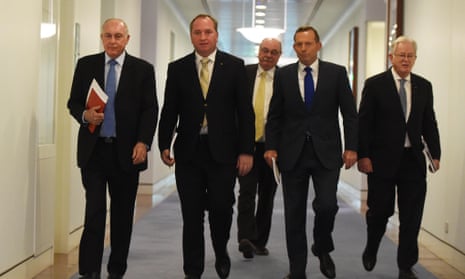The government has released a $1.2bn plan to make northern Australia an “economic powerhouse”, which includes greater temporary migration and expediting native title claims.
The white paper on developing northern Australia also recommends that the federal government cede part of its responsibilities on Indigenous cultural heritage, by accrediting state and territory schemes.
The plan, unveiled by 14 north Australian Coalition MPs on Thursday, includes a chapter on “simplifying” land arrangements in the north. It notes that large sections of Australia’s north are Indigenous land holdings or covered under native title.
“Some of the rules governing land use in the north adversely affect economic development and discourage investment,” the paper says.
It wants all existing native title claims finalised within a decade, and a quicker process for future claims, partially by giving courts the power to determine whether native title exists where an Indigenous company holds a pastoral lease.
The federal government will set aside $110m a year for four years to expedite native title claims and another $20.4m to help stakeholders initiate discussions with potential investors.
“I fully understand the passion of Indigenous people to maintain control of their land,” the prime minister, Tony Abbott, said. “But you only have to talk to Indigenous people in Cape York or east Arnhem Land to know that they also want to secure a better economic future for themselves and for their families.”
The Northern Territory chief minister, Adam Giles, said unlocking the “potential” of native title land was key to the territory’s success.
“This is great news for both Aboriginal people, who are seeking a real economic future, and business who want to pursue opportunities ranging from aquaculture to tourism on Aboriginal land,” he said.
Labor senator Nova Peris disagrees, saying the white paper “puts the interests of investors ahead of Aboriginal people”.
The Commonwealth wants to implement amendments to the Heritage Protection Act to essentially hand over control of heritage decisions to state and territory governments.
“The government will consult Indigenous Australians and industry on possible amendments to the Aboriginal and Torres Strait Islander Heritage Protection Act to reduce duplication in the heritage protection regimes across jurisdictions, while safeguarding decision-making powers for traditional owners,” the report says.
“This includes considering the establishment of a system to accredit appropriate state and territory Indigenous heritage protection regimes, thus reducing the potential for regulatory duplication once Commonwealth requirements and standards are met.”
The 190-page white paper aims to boost the economic prosperity of Australia’s northern regions.
It features a cash injection of $600m for road projects and $5m for freight projects, on top of a $5bn scheme for concessional loans already announced in the May budget.
The live cattle export trade will get a $100m funding boost, partly through the improvement of roads that service the supply chain.
$200m will be set aside for a water infrastructure fund and a further $20m on the feasibility of dams and infrastructure projects in northern Australia, including the third stage of the Ord river venture. Previous attempts to turn the Ord into a food bowl have yielded poor results.
Abbott told parliament on Thursday that Australia for too long has had a “dam phobia”. Earlier in the day, he told reporters: “This [white paper] is not just a statement of principle in favour of dams. This is putting money where our mouth is.”
The Australian Chamber of Commerce and Industry has welcomed the funding boost.
“Lack of access to water is a major constraint on economic growth in northern Australia, and building dams to strengthen irrigation and agricultural production is key to the solution,” director of economics John Osborn said. “We must not allow ideological opposition to dams to hold back development.”
Money will also be pumped into trade and tourism, as a way of attracting investment in the region, including $2.5m for fostering business links with Indonesia, Papua New Guinea and Timor-Leste.
“There’s no doubt about it. The north’s time has come. For decades [the potential] has been obvious to so many people, especially those in the north,” trade minister Andrew Robb told reporters at the unveiling of the paper on Thursday.
Visas for Indian and Chinese visitors will be fast-tracked, and a visa valid for ten-years will be trialled for Chinese visitors.
The Commonwealth is working with Western Australia on arrangements allowing non-mining-sector employers to advertise overseas for workers to fill labour market shortages. A similar arrangement came into play in the Northern Territory in February 2014.
People in Australia who are employed in sectors such as agriculture, tourism and aged-care under holiday visas will be eligible to work in Australia longer if they base themselves in the north.
“I am very happy with the relaxation of visas. We are basically fast-tracking and giving some preference to people who do make a commitment to working in the north,” Robb said.
The prime minister did not put a cap on the number of foreign workers that could come to Australia under the new arrangements.
“If people are prepared to work in northern Australia, we want to make them welcome. So provided you are prepared to work in northern Australia, some of the conditions on some visas will be relaxed,” Abbott said. “But I do want to make it absolutely crystal clear that people who come into Australia will be working in accordance with standard Australian wages and conditions.”
A cap on the number of people participating in the seasonal worker scheme, a program that trains and employs workers from Timor-Leste and nearby Pacific nations, will be removed entirely.
The seasonal workers program, currently limited to the agricultural sector, will be expanded, and a trial of the program in the tourism sector will be rolled out from 1 July.

Comments (…)
Sign in or create your Guardian account to join the discussion